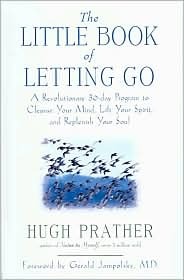What do you think?
Rate this book


In this little book on mental cleansing, Prather uses personal stories as well as step-by-step exercises to help readers understand the rewards and the process of letting go. For example, in the section on letting go of guilt and hurtful actions, Prather suggests that for at least one day readers "rise from sleep and make your purpose only this: 'I will go through this day harmlessly. I will hurt no one in my thoughts or in my actions, including myself.'" Prather includes numerous similar kinds of assignments in all of his chapters, including how to let go of..."Mental Pollutants," "Misery," "Prediction and Control," and "Spiritual Specialness." --Gail Hudson
223 pages, Hardcover
First published July 31, 2000